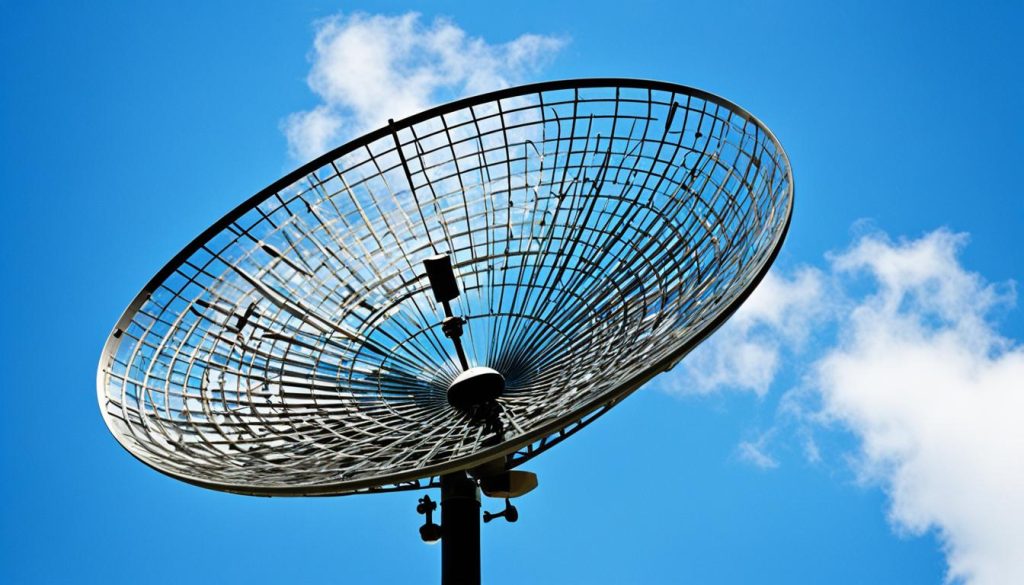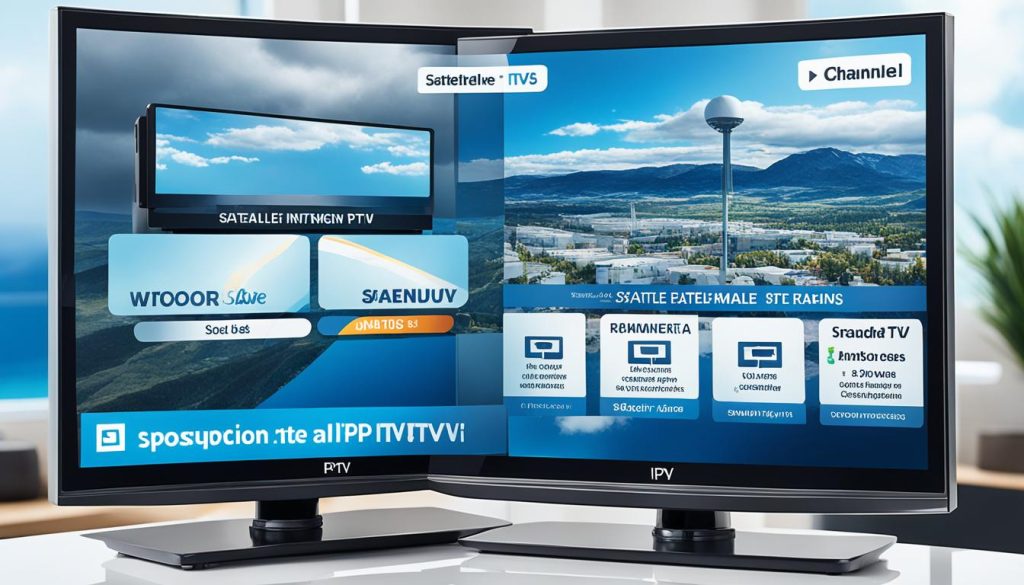The evolution of television has paved the way for multiple avenues of content consumption, with IPTV (Internet Protocol Television) and Satellite TV emerging as two prominent contenders in the realm of entertainment. Both IPTV and Satellite TV offer distinct experiences, leveraging different technologies to deliver content to viewers. This article will explore the features and contrasts between these two options, helping readers understand the key differences and make an informed choice.
Key Takeaways
- IPTV utilises internet connectivity to deliver television services, offering a versatile content selection and interactive features.
- Satellite TV relies on satellite technology to broadcast signals, providing extensive coverage and consistent signal quality.
- The choice between IPTV and Satellite TV depends on factors such as geographical location, internet availability, desired content variety, and viewing preferences.
- IPTV’s accessibility is influenced by internet infrastructure, while Satellite TV’s initial setup costs can be higher.
- Both mediums continue to evolve, ensuring an ever-expanding landscape of entertainment options for consumers.
Understanding IPTV: The Evolution of Television Viewing
IPTV, or Internet Protocol Television, represents a revolutionary approach to television viewing, harnessing the power of the internet to redefine how we access and experience entertainment. By delivering television services over the internet, IPTV offers users a vast array of content, including live TV, on-demand shows, movies, and a host of interactive features that have transformed the traditional television landscape.
IPTV: Redefining TV Viewing Through Connectivity
The core of IPTV lies in its ability to leverage the internet’s connectivity, allowing users to access a diverse range of content with unprecedented convenience. Whether it’s catching the latest news, binge-watching a popular series, or exploring a wide selection of movies, IPTV empowers viewers to curate their viewing experiences like never before.
Advantages of IPTV
IPTV’s rise to prominence is underpinned by several key advantages that have captivated both casual and avid viewers. From a versatile content selection to multi-device accessibility and interactive capabilities, IPTV offers a compelling proposition that continues to redefine the future of television.
Versatile Content Selection
IPTV services often provide a rich variety of channels and on-demand content, catering to diverse viewer preferences. Whether you’re a fan of live sports, the latest blockbuster movies, or niche documentaries, IPTV’s extensive channel selection and on-demand offerings ensure that there’s something to suit every taste.
Multi-Device Accessibility
One of the key advantages of IPTV is its ability to deliver content across a range of devices. Viewers can enjoy IPTV content on smart TVs, smartphones, tablets, and computers, ensuring a seamless and multi-device accessible viewing experience. This flexibility empowers users to access their favourite content anytime, anywhere, offering unparalleled convenience.
Interactive Capabilities
IPTV’s interactive features set it apart from traditional television. With the ability to pause, rewind, and access on-demand content, IPTV grants users greater control over their viewing experience. This interactivity elevates the entertainment value, allowing viewers to tailor their viewing habits to their preferences and schedules.
Enhanced Quality
As internet speeds continue to improve, IPTV can now deliver high-definition and even 4K streaming, promising a visually stunning and immersive viewing experience. The enhanced streaming quality offered by IPTV ensures that viewers can enjoy their content with exceptional clarity and detail, further enhancing the overall entertainment experience.
Satellite TV: A Reliable Broadcasting Titan
Satellite TV utilises satellites to transmit signals directly to satellite dishes installed at user locations. This technology has been a longstanding choice for accessing television content. Satellite TV offers several advantages, such as extensive coverage, consistent signal quality, and live event broadcasting.
Extensive Coverage
Satellite TV can reach remote and rural areas where terrestrial cable connections might not be available, offering a widespread broadcasting footprint. Unlike internet-dependent services, Satellite TV tends to offer stable signal quality, less affected by internet bandwidth or connectivity fluctuations.
Consistent Signal Quality
Satellite TV’s signal quality remains consistent, regardless of the viewer’s location or weather conditions. This reliability ensures a seamless viewing experience, even in areas where equipment requirements or installation process might pose challenges for other television services.
Live Event Broadcasting
Satellite TV excels in broadcasting live events such as sports, news, and global programmes, delivering real-time content to viewers worldwide. This capability makes Satellite TV a preferred choice for channel selection and future trends in the television industry, where immediate access to breaking news and live entertainment is highly valued.

How does IPTV compare to satellite TV?
When examining the accessibility of IPTV and Satellite TV, distinct differences emerge. IPTV’s reliance on a robust internet connection means that areas with poor internet infrastructure may face limitations in streaming quality or interruptions during network issues. Conversely, Satellite TV requires a clear line of sight to the satellite, making it susceptible to disruptions during severe weather conditions or obstructions blocking the signal path.
Regarding the cost dynamics, IPTV often involves subscription fees that are generally competitive compared to traditional cable or Satellite TV services. However, Satellite TV’s initial setup costs can be higher due to satellite dish and set-top box expenses, though the ongoing monthly fees might be on par or slightly higher than IPTV subscriptions.
| Feature | IPTV | Satellite TV |
|---|---|---|
| Streaming Quality | Dependent on internet connection | Less affected by internet bandwidth |
| Equipment Requirements | Requires internet-connected device | Requires satellite dish and set-top box |
| Cost Comparison | Competitive subscription fees | Higher initial setup costs, but similar monthly fees |
| Installation Process | Easier setup, no physical installation required | Professional installation of satellite dish often necessary |
Conclusion
Both IPTV and Satellite TV offer unique advantages and cater to different consumer needs. IPTV champions the digital revolution, providing diverse content options and interactive features that captivate viewers. In contrast, Satellite TV upholds its reliability and wider coverage, especially in remote regions where internet infrastructure may be limited.
When making a choice between IPTV and Satellite TV, several key factors come into play. Geographical location, desired content variety, internet availability, and the preferred viewing experience all play crucial roles in determining the most suitable option. As technology progresses, these mediums continue to evolve, ensuring an ever-expanding landscape of entertainment options for consumers worldwide.
Ultimately, the decision between IPTV and Satellite TV rests on the individual’s needs, preferences, and the specific circumstances of their location. By understanding the strengths and limitations of each platform, consumers can make an informed choice that aligns with their entertainment requirements and provides a truly immersive viewing experience.
FAQ
What is the key difference between IPTV and satellite TV?
The primary difference lies in the method of content delivery. IPTV operates on the principle of delivering television services over the internet, whereas satellite TV utilises satellites to transmit signals directly to satellite dishes installed at user locations.
What are the advantages of IPTV?
IPTV offers several advantages, such as a versatile content selection, multi-device accessibility, interactive capabilities, and enhanced quality. IPTV services often provide a rich variety of channels and on-demand content, and users can enjoy IPTV content on various devices like smart TVs, smartphones, tablets, and computers.
What are the advantages of satellite TV?
Satellite TV offers advantages such as extensive coverage, consistent signal quality, and live event broadcasting. Satellite TV can reach remote and rural areas where terrestrial cable connections might not be available, and it tends to offer a stable signal quality, less affected by internet bandwidth or connectivity fluctuations.
How do IPTV and satellite TV compare in terms of accessibility?
IPTV is highly dependent on a robust internet connection, and areas with poor internet infrastructure might face limitations in streaming quality or interruptions during network issues. Conversely, satellite TV requires a clear line of sight to the satellite, making it susceptible to disruptions during severe weather conditions or obstructions blocking the signal path.
How do the costs of IPTV and satellite TV compare?
IPTV often involves subscription fees, generally competitive compared to traditional cable or satellite TV services. On the other hand, satellite TV’s initial setup costs can be higher due to satellite dish and set-top box expenses, but ongoing monthly fees might be on par or slightly higher than IPTV subscriptions.



